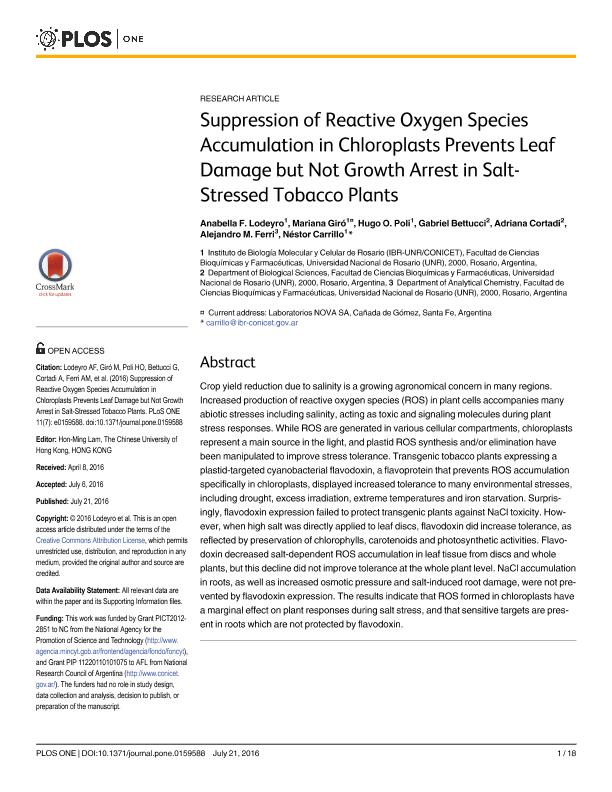Artículo
Suppression of reactive oxygen species accumulation in chloroplasts prevents leaf damage but not growth arrest in salt-stressed tobacco plants
Lodeyro, Anabella Fernanda ; Giró, Mariana
; Giró, Mariana ; Poli, Hugo Omar
; Poli, Hugo Omar ; Bettucci, Gabriel; Cortadi, Adriana Amalia; Ferri, Alejandro M.; Carrillo, Nestor Jose
; Bettucci, Gabriel; Cortadi, Adriana Amalia; Ferri, Alejandro M.; Carrillo, Nestor Jose
 ; Giró, Mariana
; Giró, Mariana ; Poli, Hugo Omar
; Poli, Hugo Omar ; Bettucci, Gabriel; Cortadi, Adriana Amalia; Ferri, Alejandro M.; Carrillo, Nestor Jose
; Bettucci, Gabriel; Cortadi, Adriana Amalia; Ferri, Alejandro M.; Carrillo, Nestor Jose
Fecha de publicación:
07/2016
Editorial:
Public Library of Science
Revista:
Plos One
ISSN:
1932-6203
Idioma:
Inglés
Tipo de recurso:
Artículo publicado
Clasificación temática:
Resumen
Crop yield reduction due to salinity is a growing agronomical concern in many regions. Increased production of reactive oxygen species (ROS) in plant cells accompanies many abiotic stresses including salinity, acting as toxic and signaling molecules during plant stress responses. While ROS are generated in various cellular compartments, chloroplasts represent a main source in the light, and plastid ROS synthesis and/or elimination have been manipulated to improve stress tolerance. Transgenic tobacco plants expressing a plastid-targeted cyanobacterial flavodoxin, a flavoprotein that prevents ROS accumulation specifically in chloroplasts, displayed increased tolerance to many environmental stresses, including drought, excess irradiation, extreme temperatures and iron starvation. Surprisingly, flavodoxin expression failed to protect transgenic plants against NaCl toxicity. However, when high salt was directly applied to leaf discs, flavodoxin did increase tolerance, as reflected by preservation of chlorophylls, carotenoids and photosynthetic activities. Flavodoxin decreased salt-dependent ROS accumulation in leaf tissue from discs and whole plants, but this decline did not improve tolerance at the whole plant level. NaCl accumulation in roots, as well as increased osmotic pressure and salt-induced root damage, were not prevented by flavodoxin expression. The results indicate that ROS formed in chloroplasts have a marginal effect on plant responses during salt stress, and that sensitive targets are present in roots which are not protected by flavodoxin.
Palabras clave:
Salinity
,
Flavodoxin
,
Ros
Archivos asociados
Licencia
Identificadores
Colecciones
Articulos(IBR)
Articulos de INST.DE BIOLOGIA MOLECULAR Y CELULAR DE ROSARIO
Articulos de INST.DE BIOLOGIA MOLECULAR Y CELULAR DE ROSARIO
Citación
Lodeyro, Anabella Fernanda; Giró, Mariana; Poli, Hugo Omar; Bettucci, Gabriel; Cortadi, Adriana Amalia; et al.; Suppression of reactive oxygen species accumulation in chloroplasts prevents leaf damage but not growth arrest in salt-stressed tobacco plants; Public Library of Science; Plos One; 11; 7; 7-2016; 1-18
Compartir
Altmétricas



